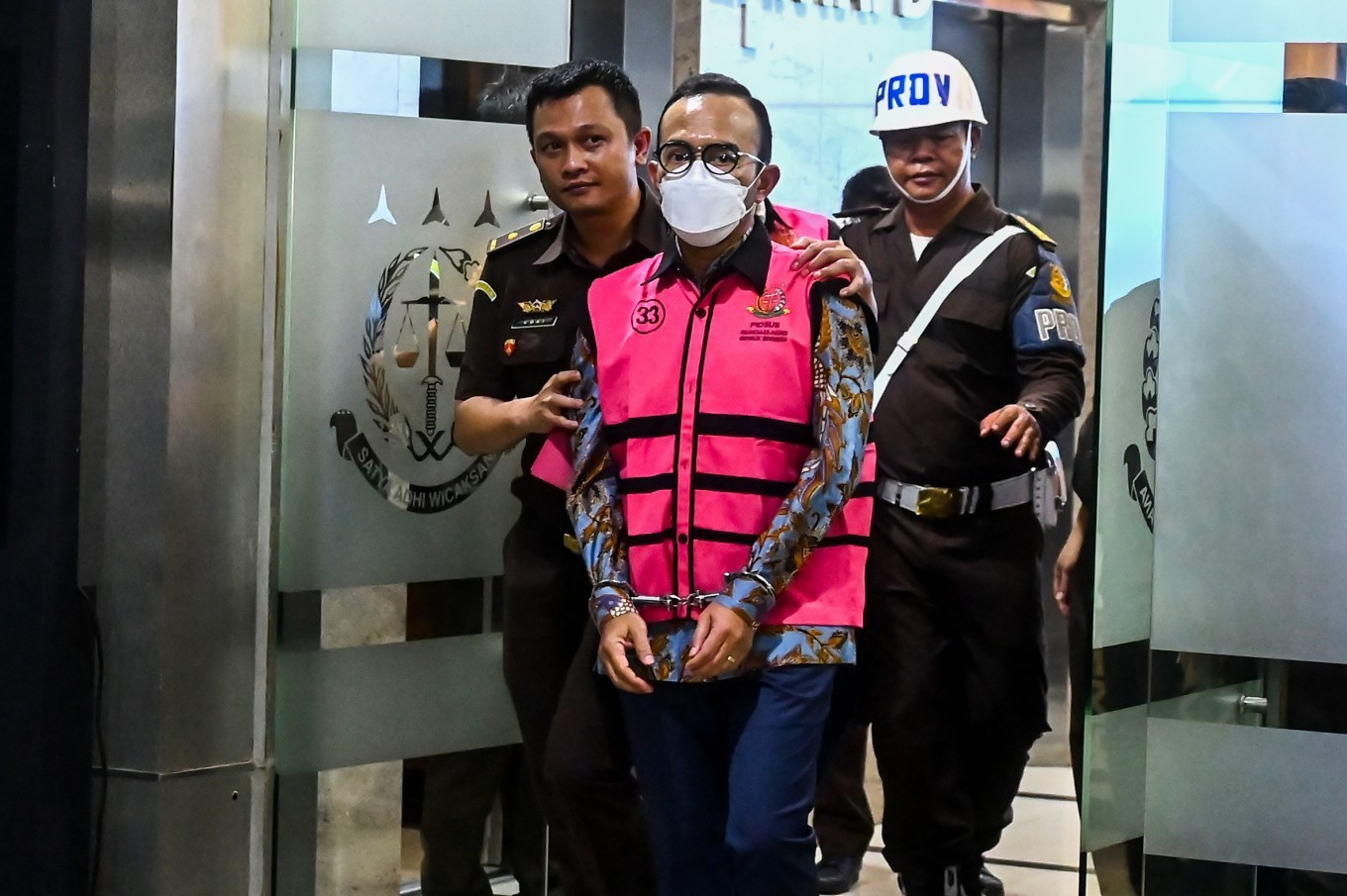News
Pertamina corruption case expands, private sector dragged
Tenggara Strategics October 28, 2025 Riva Siahaan, the president director of PT Pertamina Patra Niaga, the commercial arm of state-owned oil and gas giant Pertamina, is detained after being named a suspect in a corruption case by the Attorney General's Office (AGO) in Jakarta on Feb. 25, 2025. (Antara Foto/Rivan Awal Lingga)
Riva Siahaan, the president director of PT Pertamina Patra Niaga, the commercial arm of state-owned oil and gas giant Pertamina, is detained after being named a suspect in a corruption case by the Attorney General's Office (AGO) in Jakarta on Feb. 25, 2025. (Antara Foto/Rivan Awal Lingga)
Several private companies, including Garibaldi "Boy" Thohir's Adaro Energy, have been dragged into the spotlight after prosecutors charged PT Pertamina and its subsidiary, PT Pertamina Patra Niaga (PPN), with corruption that allegedly cost the state trillions of rupiah. The case centers on the underpricing of unsubsidized Solar and Biosolar, Pertamina's diesel and biodiesel fuel brands, sold to numerous private sector buyers. The indictment, which could result in state losses of up to hundreds of trillions of rupiah, has sparked a heated debate among experts and civil society. Some caution against the potential criminalization of private sector buyers, while others insist on pursuing all possible corporate links to the corruption scheme.
In the indictment against former PT PPN President Director Riva Siahaan at the Central Jakarta District Court, prosecutors alleged that Pertamina (2018–2021) and PPN (2021–2023) sold unsubsidized Solar and Biosolar below the official floor price to 73 industrial consumers. The prices were reportedly even lower than the base price and cost of goods sold for subsidized fuels, causing an estimated Rp 9.41 trillion (US$566.7 million) in state losses. Pertamina also allegedly failed to regularly evaluate and adjust the erroneous pricing.
According to the indictment, the sales violated Pertamina's Guidelines for Marketing Management of Industrial and Marine Fuels No. A-001/F00000/2016-S9, which require fuel prices to reflect both the landed cost (total cost from production to delivery) and the pocket margin (the profit margin above costs). Pertamina was accused of not setting a pocket margin during 2018–2019 and of failing to issue a price negotiation guideline.
As for Siahaan, prosecutors charged that he signed contracts for the sale of Solar and Biosolar below the minimum price, violating PPN's Guidelines for Marketing Management of Industrial and Marine Fuels No. A02-001/PNC200000/2022-S9 and failing to establish a price negotiation procedure as required under President Director Decree No. Kpts034/PNA000000/2022-S0. His actions allegedly caused Rp 2.45 trillion in state losses.
Thirteen companies reportedly purchased underpriced fuel from PT PPN between 2018 and 2023, collectively saving significant sums:
- PT Pamapersada Nusantara (Astra Group) — Rp 958.38 billion
- PT Berau Coal Energy (Sinar Mas Group) — Rp 449.1 billion
- PT Bukit Makmur Mandiri Utama — Rp 264.14 billion
- PT Merah Putih Petroleum (Energi Asia Nusantara / Andita Niaisjah Hanafiah) — Rp 256.23 billion
- PT Adaro Indonesia (Adaro Group) — Rp 168.51 billion
- PT Ganda Alam Makmur (Titan Group / LX International JV) — Rp 127.99 billion
- PT Indo Tambangraya Megah (Banpu Group) — Rp 85.8 billion
- PT Maritim Barito Perkasa (Adaro Group) — Rp 66.48 billion
- PT Vale Indonesia (Vale S.A.) — Rp 62.14 billion
- PT Indocement Tunggal Prakarsa (Heidelberg Materials AG) — Rp 42.51 billion
- PT APP Purinusa Ekapersada (Sinar Mas Group) — Rp 32.11 billion
- PT Aneka Tambang / Antam (MIND ID) — Rp 16.79 billion
- PT Nusa Halmahera Minerals (Indotan Halmahera Bangkit) — Rp 14.06 billion
The underpricing case is part of a broader web of alleged corruption within Pertamina, which prosecutors say caused up to Rp 285 trillion in total state losses. The scandal included a scheme for fraudulent oil import contracts involving PT Tanki Merak and PT Orbit Terminal Merak and fuel adulteration between 2018–2023 that implicated the "godfather of oil" Muhammad Riza Chalid. Riza's son Muhammad Kerry Adrianto Riza, beneficial owner of PT Navigator Khatulistiwa, allegedly got marked-up contracts to ship Pertamina's fuel products.
Some legal experts have urged caution, warning that criminalizing corporate buyers could scare off investors and mischaracterize legitimate business transactions. They note that the private companies were not active participants but passive beneficiaries of Pertamina's pricing decisions. Others, however, argue that the Attorney General's Office (AGO) must enforce the law without bias, even against powerful corporations, since any proven wrongdoing amounts to robbing the public of their rights and should result in revoked business licenses.
Indonesia's oil and gas sector has long been plagued by what is often called the "oil and gas mafia." How the government handles Pertamina's sprawling corruption scandal, including the Solar and Biosolar underpricing, may determine whether this entrenched influence can finally be dismantled. Yet, recent executive interference in the judiciary, such as during the Tom Lembong case, which broadened the definition of state losses, could complicate both the verdict and its enforcement.
What we've heard
Several sources have reported that corruption allegations at PT PPN, which have implicated several private companies, have become a gateway for the AGO to "target" the owners behind those companies, particularly Adaro Minerals Indonesia, a subsidiary of the Adaro Group.

